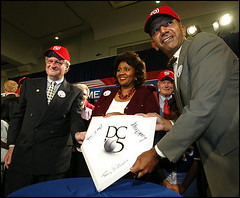Get it in the contract or you have no leverage
 Mark Touhey, chairman of the D.C. Sports and Entertainment Council, left, Linda Cropp, chairman of the D.C. City Council, center, and Washington, D.C. Mayor Anthony Williams, signed a symbolic home plate after announcing the relocation of Montreal Expos' baseball team to his city, Wednesday, Sept. 29, 2004, in Washington.(AP Photo/Lawrence Jackson)
Mark Touhey, chairman of the D.C. Sports and Entertainment Council, left, Linda Cropp, chairman of the D.C. City Council, center, and Washington, D.C. Mayor Anthony Williams, signed a symbolic home plate after announcing the relocation of Montreal Expos' baseball team to his city, Wednesday, Sept. 29, 2004, in Washington.(AP Photo/Lawrence Jackson)Last weekend's newspapers discussed the failure of the City to do a deal with Herb Miller for a mixed-use something or other by the new stadium, and the Post editorialized about it yesterday, "Mayor Williams's Dead Deal." Of course, the Post has been against mixed use at the stadium site for awhile and fully in the Lerner camp on this issue--which makes me wonder if the Post editorialists understand urban vs. suburban design... But I am pretty tired of this battle. Here are a number of entries I wrote about this general issue last year.
-- Baseball, Hot Dogs, Apple Pie, and Mixed Primary Uses
-- Baseball, Hot Dogs, Apple Pie, and Business as Usual
-- Baseball, Hot Dogs, Apple Pie, and Transit
-- Denver's Delightful LoDo District-- A Lesson for Stadium District Development
-- Unforced Error: DC Officials Bobble the Ball When it Comes to Transit, Urban Design and the New Stadium.
_________
Note: since these pieces were written, the Anacostia Waterfront Corporation has done a number of pro-urban things. I don't know if it's because they already were thinking this way (likely) or because writings such as these have had some effect. Still, authenticity is an issue, see "Batter up, "M Street Live." Is inauthenticity on the horizon for the Anacostia SE Waterfront?"
_________
This fits in with something else though. Last weekend, I met someone who works for the Bureau of National Affairs, a large employee-owned publisher of expensive newsletters about government. About 10 years ago, they got a huge property tax reduction as an economic development measure, to stay in DC. As soon as the exemption was about to end, they made plans to move to Crystal City.
From a press release:
BNA, a wholly employee owned news and information publisher, today announced that it will move its headquarters to Arlington, Virginia in the spring of 2007.
At a press conference led by Virginia Governor Mark Warner, BNA’s President and CEO Paul N. Wojcik confirmed that the company has reached an agreement in principle with Charles E. Smith Commercial Realty, a division of Vornado Realty Trust, for the purchase of the 290,000 square foot office building at 1801 S. Bell Street in Crystal City. The building will be fully renovated for BNA.
In Crystal City, BNA will consolidate more than 1000 reporters, editors, and attorneys, as well as technical, marketing, sales and support professionals, under one roof. BNA’s Washington operations are now spread across the company’s three buildings at 1227, 1229, and 1231 25th Streets, N.W., as well as in leased space at 1250 23rd Street, N.W. The Crystal City building also will afford the company space for future growth.
Why were there no recapture provisions in the agreement, if they didn't stay in DC for at least 5-10 years after the tax cap ended? Or at the very least, a right of first refusal to match similar offers from elsewhere (without tax givebacks).
There are plenty of buildings large enough for them in DC. Or they could have agreed to take on the third building at Station Place, etc.
Why didn't the DC Government (1) write a contract with Major League Baseball that didn't have almost impossible construction deadlines; (2) mixed-use provisions; and (3) requirements for underground, not aboveground, parking?
Once the contract is signed you have no leverage. None. I repeat: Once the contract is signed you have no leverage.
This is why I am always disgusted when community types and alleged thinking activists ask for "community amenities" after approving a project and not before.
Afterwards, it's not even worth attempting to hold a conversation. And this is with presumably intelligent, aware people...
But then, if the DC Government doesn't think to include such provisions, you can't be too critical of neighborhood associations and ANCs for being "rubes" or "bamas" as well.
-----------
Addendum: I realize after writing that this is really about two different points.
1. Protect yourself, make demands, recognize your value;
2. Get it in the contract.
With regard to the first point, also see "Maybe DC can learn that it has something that developers want."
Index Keywords: stadiums-arenas; negotiating; impact-fees-amenities



0 Comments:
Post a Comment
<< Home